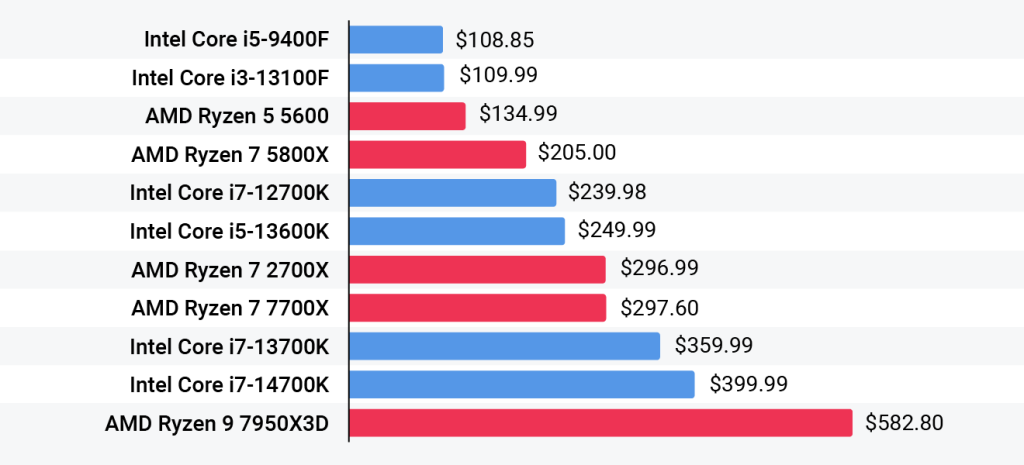Gaming performance is no longer just about GPU horsepower. The CPU plays a pivotal role in maintaining smooth gameplay, driving high frame rates (FPS), and eliminating performance bottlenecks. In 2025, the battle between Intel vs Ryzen for gaming has reached new levels of intensity, with both brands offering impressive lineups across various price points. In this analysis, we compare gaming CPUs from Intel and AMD in terms of raw FPS, thermal behavior, pricing, and value-for-money—helping gamers make the best-informed choice possible.

Gaming CPU Needs
Gaming workloads are single-thread intensive, especially in competitive titles like CS2, Valorant, and Fortnite. However, modern games also utilize multiple threads, especially in open-world or sandbox genres. Hence, clock speed, IPC (instructions per cycle), and core optimization now matter more than ever.
Key Metrics for Gaming CPU Comparison
To determine which processor brand currently holds the advantage, we use the following metrics:
-
FPS in 1080p, 1440p, and 4K
-
Thermal Design Power (TDP)
-
Power Efficiency
-
Price-to-Performance Ratio
-
Overclocking Potential
Let’s examine how Ryzen vs Intel FPS benchmarks shape up across popular gaming titles and hardware platforms.
High-End Segment: Core i9 vs Ryzen 9
| CPU Model | Average FPS (1080p, RTX 4090) | Power Draw | Base/Boost Clock | Price (USD) |
|---|---|---|---|---|
| Intel Core i9-14900K | 268 FPS | 253W | 3.2 / 6.0 GHz | $579 |
| AMD Ryzen 9 7950X3D | 273 FPS | 142W | 4.2 / 5.7 GHz | $589 |
AMD’s 3D V-Cache continues to deliver impressive results in games, especially in CPU-bound scenarios. The Ryzen 9 7950X3D edges out the i9 in many titles thanks to its massive L3 cache and efficient Zen 4 architecture.
Mid-Range Performance: Core i7 vs Ryzen 7
| CPU Model | Average FPS (1080p, RTX 4070) | Power Draw | Base/Boost Clock | Price (USD) |
|---|---|---|---|---|
| Intel Core i7-14700K | 241 FPS | 219W | 3.4 / 5.6 GHz | $409 |
| AMD Ryzen 7 7800X3D | 259 FPS | 120W | 4.2 / 5.0 GHz | $449 |
The 7800X3D has become the go-to CPU for serious gamers who want top-tier performance without GPU bottlenecking. It consistently leads FPS charts in titles like Cyberpunk 2077, Forza Horizon 5, and Starfield.
Budget Gaming Battle: Core i5 vs Ryzen 5
| CPU Model | Average FPS (1080p, RTX 4060) | Power Draw | Base/Boost Clock | Price (USD) |
|---|---|---|---|---|
| Intel Core i5-13400F | 185 FPS | 148W | 2.5 / 4.6 GHz | $189 |
| AMD Ryzen 5 7600 | 198 FPS | 65W | 3.8 / 5.1 GHz | $229 |
In the budget category, Intel offers slightly better value, especially when bundled with DDR4 motherboards. However, Ryzen 5 7600 outpaces it in power efficiency and raw gaming numbers.
Thermal Performance & CPU Cooling Needs
A critical consideration in any CPU choice is how hot the chip runs under sustained loads.
The AMD Ryzen 7000 series with 3D V-Cache runs cooler under gaming stress, due to lower voltage requirements and smarter power delivery. Intel’s 14th-gen chips, while powerful, can run hot and draw more watts, making cooling solutions a critical budget addition.
Power Efficiency Comparison
While Intel chips bring aggressive turbo clocks, the trade-off comes in significantly higher power draw, especially during gaming and multitasking.
-
Intel Core i9-14900K: Peaks at 250W+ under load.
-
AMD Ryzen 9 7950X3D: Caps near 140W while maintaining competitive FPS.
If electricity cost, thermal output, or environmental concerns matter, AMD CPUs deliver more gaming per watt.
Motherboard Compatibility & Platform Costs
-
Intel’s 14th-gen CPUs are still compatible with LGA1700 boards from the 12th-gen era, reducing upgrade costs.
-
AMD’s AM5 platform is more future-proof, with support through 2026. However, AM5 boards and DDR5 RAM add initial cost.
Overclocking & Tuning Potential
Intel still holds the crown in manual overclocking flexibility, especially on unlocked K-series chips. AMD, in contrast, focuses more on smart boosting and voltage-controlled efficiency via Curve Optimizer and PBO (Precision Boost Overdrive). Gamers who prefer plug-and-play setups may prefer AMD, while enthusiasts who enjoy tweaking may lean Intel.
Which Brand Wins for Gaming?
Summary Table: Intel vs Ryzen Gaming Verdict
| Segment | Winner | Reason |
|---|---|---|
| High-End | AMD Ryzen 9 7950X3D | Best FPS, better power efficiency |
| Mid-Range | AMD Ryzen 7 7800X3D | Consistently top in gaming benchmarks |
| Budget | Intel Core i5-13400F | Better value, cheaper platform |
| Efficiency | AMD | Lower TDP and cooler under sustained gaming loads |
| Overclocking | Intel | More flexibility and BIOS tuning options |
Both Intel and AMD offer excellent gaming CPUs in 2025. The choice largely depends on your budget, preferred resolution, and whether you prioritize raw FPS, power draw, or upgrade longevity. However, with the emergence of 3D V-Cache technology, AMD has taken a firm lead in delivering top-tier gaming experiences, especially in CPU-bound scenarios.
For gamers investing in high-refresh-rate monitors or pushing competitive FPS targets, Ryzen 7000 X3D series processors currently represent the gold standard.
Intel still offers strong value, especially in the budget and overclocking segments, but needs improved thermal management and efficiency to reclaim dominance.




